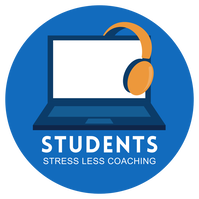Welcome to the blog
The Students Stress Less Coaching blog has a wealth of FREE resources, ranging in topics from executive function skills to exam prep. Enjoy.
|
Psychoeducation involves teaching someone about their cognitive processes, feelings, behaviors, and mental health struggles as a form of "intervention" or treatment.
The term “psychoeducation” was first employed by Anderson et al22 and was used to describe a behavioral therapeutic concept consisting of 4 elements:
Here at Students Stress Less Coaching LLC we use elements of this therapeutic teaching concept as it relates to the brain and behaviors that cause college students to struggle with executive function challenges like:
Why do I use psycho (cognitive) education as a part of the coaching process with students who struggle with executive functioning? First, students need to know (need a visual) what their brain is doing, how it is firing and communicating, how is processes internal and external information, and how it contributes to their feelings related to their ADHD or their executive functioning struggles. Neuroplasticity (how the brain develops, changes, adapts, makes new connections) is the term we use in coaching to help students understand that they can practice new habits while soothing the needs of the primitive brain (like eating, breathing, and sleeping), so they can learn new information and adapt to internal and external world demands. When the primitive brain is not content, higher order thinking "goes off line" - this is when executive function challenges present. This knowing becomes the foundation for regulating emotions and strengthening neural pathways. Student think before they act, learn to listen to body messages, make wise decisions, manage distractions, and are able to direct the cognitive skills necessary to get everything done that is required of them in college. Task execution, task completion, goal persistence, holding the goal in mind (working memory), planning and self-directing, and the ability to prioritize are all improved when the student is aware of how the brain is directing the behaviors and thoughts. Secondly, using psychoeducation as a "tool" in coaching enables the student to self-reflect which builds the self-awareness needed to strengthen executive function skills like better self-managing time, emotions, and life's curve balls. We call this skill metacognition, and most students with whom I partner have moderate to severe issues with recognizing, understanding, and accepting their daily challenges. Psycho-cognitively educating students about why it is easier to focus on preferred tasks versus not preferred tasks (homework), why they have a hard time falling to sleep at night, and why they freeze when overwhelmed helps them grow metacognition while relying on external supports and structures (daily systems of operation). Finally, using components of psychoeducation helps students understand that feelings of laziness, guilt, shame, and frustration can be separated from the reality which is the brain is in need of support in order for the desired behaviors (go to class, hand in completed assignment, remember the dates, finish the tasks on time, break down large overwhelming tasks into smaller doable steps) to occur. Students feel a sense of relief and empowerment when they know their challenges are a "brain thing" and not a *Johnny or Suzie thing. Psychoeducation is one of my most utilized tools in the coaching process.
0 Comments
Leave a Reply. |
|
